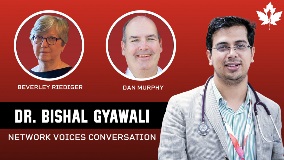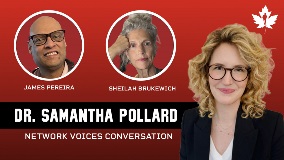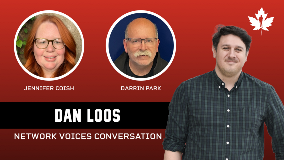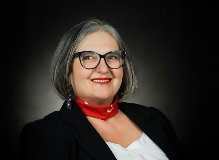Researcher Profile: A Q&A with Dr. Pinaki Bose

Dr. Pinaki Bose has always liked to ask questions. Perhaps too many, as he readily admits.
Throughout his childhood, this incessant curiosity earned him exasperated looks from teachers and parents alike, but today it’s what fuels his biggest passion: cancer research.
As a scientist at the University of Calgary and lead of pan-Canadian collaborative of head and neck cancer specialists within the Marathon of Hope Cancer Centres Network, Dr. Bose uses his curiosity, as well as cutting-edge tools like spatial transcriptomics and artificial intelligence to uncover why some tumours behave more aggressively than others, and how to treat them more precisely. His goal? To improve outcomes and quality of life for cancer patients in Canada and beyond.
In this Q&A, Dr. Bose reflects on the winding path that led him to cancer research, the value of collaboration, and the inspiration he draws from Terry Fox’s legacy and the hope of a future where every Canadian can benefit from truly personalized cancer care.
Why did you become a cancer researcher? Was there a particular moment or experience that led to this decision?
From a very young age, I was endlessly curious…. much to the frustration of my parents and teachers. I would constantly ask why, often without stopping to catch my breath. Looking back, I think the art of asking questions is one of the most powerful tools we can nurture, and perhaps one that deserves more space in formal education. For me, that relentless curiosity naturally drew me to science, and in particular, to biology. What fascinated me most about biology was that it wasn't about building something new from existing components as in engineering or the physical sciences, but about uncovering what already exists, yet remains hidden. That sense of mystery, of piecing together how living systems work and sometimes go wrong, captivated me in high school and stayed with me.
My first real exposure to cancer research came during my undergraduate studies. I had the opportunity to work in a cancer biology lab, and I was immediately hooked. Since then, the journey has become even more personal. Like so many others, I’ve lost family members and close friends to cancer. Each of those losses reinforced the urgency and meaning behind the work I do. They remind me that behind every dataset, every tumour sample, and every research question is a human life.
Becoming a cancer researcher wasn’t a single moment; it was a gradual, deeply personal evolution shaped by curiosity, discovery, and loss. Today, that combination continues to drive my commitment to finding answers that can make a real difference.
Cancer research is difficult: progress is slow and for every step forward there may be quite a few steps backwards or sideways. What inspires you to keep going? What life lessons have you learned through cancer research?
Most days in cancer research feel like an uphill climb, and it’s easy to get discouraged. But what keeps me going is the same thing that keeps a cancer patient going: hope. Hope that the next discovery will unlock a new therapy, a new understanding, or a new chance at life.
One of the greatest sources of inspiration for me is the opportunity to mentor and train the next generation of cancer researchers. It is my way of giving back what my own mentors so generously gave to me. Watching young scientists grow in confidence, curiosity, and capability reminds me that our efforts today lay the foundation for tomorrow’s breakthroughs. Their passion reinvigorates mine.
I have learned that research is not just about results, it is about resilience. The life lesson I carry from this field is that perseverance matters. Just as cancer patients face their journeys with courage and determination, we must face the scientific unknown with grit and humility. Our work may not always yield immediate answers, but it builds the cumulative knowledge that will one day change lives.
How would you explain your current research focus to a cancer patient or their family member?
My current research focuses on understanding why some cancers are more aggressive than others, and developing new, more effective treatments that go beyond what is available currently to patients. We do this by studying tumours at a very detailed molecular level, looking at genes, proteins, and immune responses to find patterns that help us better predict how a cancer will behave and how it might respond to treatment.
One of the most powerful tools we now have is called spatial transcriptomics. This allows us to map not only which genes are active in a tumour, but exactly where in the tissue they are active. It's like looking at a high-resolution map of the tumour, information that is crucial to understanding how cancer grows and spreads, and where it might be most vulnerable.
But with so much complex data coming from each tumour, we also need help making sense of it. That’s where artificial intelligence and machine learning come in. These technologies help us analyze massive datasets, spot hidden patterns, and make predictions that would be impossible to do manually.
We are using these approaches in head and neck cancer research, but the impact extends across many cancer types. The ultimate goal is to bring truly personalized medicine to patients where treatment decisions are guided by the unique biology of each person’s tumour.
What impact do you hope your research will have on cancer treatment and the outcomes for patients?
I hope my research, like many other fellow scientists within MOHCCN, will help bring us closer to truly personalized cancer care where each patient receives the right treatment, at the right time, based on the unique biology of their tumour. By understanding the molecular and spatial complexity of cancers, and by applying advanced tools like spatial transcriptomics and artificial intelligence, we aim to identify new treatment targets, improve how we predict therapy responses, and ultimately design better, more effective strategies for each patient.
The impact I hope for is twofold: first, to improve outcomes so that patients live longer, healthier lives; and second, to reduce the trial-and-error burden of cancer treatment, which can be physically and emotionally exhausting for patients and their families.
Just like Terry Fox united Canadians nearly 45 years ago, the Marathon of Hope Cancer Centres Network is uniting researchers, clinicians, patients and administrators from cancer treatment and research institutions across Canada to accelerate precision medicine. How important is this collaboration and what impact do you think it could have on cancer research and treatment?
Just like Terry Fox united Canadians nearly 45 years ago with his courage and vision, the MOHCCN is uniting a new generation of researchers, clinicians, patients, and healthcare leaders toward a common goal: to accelerate the adoption of precision medicine in cancer care.
This kind of collaboration is absolutely vital. Cancer is not a single disease, and no single lab, institution, or province can solve its complexities alone. What MOHCCN enables is a level of coordination and data sharing that was previously difficult to achieve in Canada. By bringing together diverse expertise and harmonizing efforts across the country, we are building a “learning cancer system”, one that can adapt in real time, learn from every patient, and translate discoveries into treatments faster.
As someone leading a national effort in head and neck cancer research within MOHCCN, I see firsthand how this network is breaking down silos and creating new opportunities to ask bold questions and tackle challenges we could not before. It is empowering smaller centres, enabling equity of access, and ultimately ensuring that scientific advances benefit all Canadians, regardless of geography.
If a researcher, clinician, patient or donor asked you why the Marathon of Hope Cancer Centres Network is important, what would you tell them?
MOHCCN is more than a research initiative, it is a Canadian movement inspired by Terry Fox’s vision of a world without cancer. As a member, I see this Network as the embodiment of collaboration, equity, and hope.
MOHCCN brings together researchers, clinicians, patients, and institutions from across the country to harness the power of precision oncology. No single institution or individual can tackle the complexity of cancer alone, but by uniting under a shared vision, we can accelerate discoveries, harmonize data, and ensure that the benefits of cutting-edge research reach every Canadian, no matter where they live. To patients, this means more personalized and effective treatments. To clinicians, it means access to world-class tools to guide care. To researchers, MOHCCN is a platform for collaboration that breaks down silos and amplifies impact. And to donors, it’s a promise: that every dollar contributes to a coordinated, national effort to deliver on the dream Terry Fox started.
What does Terry Fox mean to you? How does Terry inspire you?
As a cancer researcher, Terry Fox represents the very ethos of why we do what we do. His story is one of courage, resilience, and an unwavering belief that a single individual can create meaningful change. As someone who came to Canada from India as an international student to pursue a PhD, I was profoundly moved by Terry’s legacy even before I fully understood the breadth of his impact. Today, as a faculty member leading a pan-Canadian initiative in head and neck cancer research, I see Terry’s vision reflected in every collaborative stride we take toward curing cancer.
Terry was not a scientist, but his determination has fueled generations of scientific discovery. He understood that the fight against cancer is not a sprint—it’s a marathon. That mindset resonates deeply with me. Research is painstaking, filled with setbacks, but like Terry, we keep moving forward, driven by the belief that our discoveries can transform lives.
His journey has become a powerful symbol for me; not only of the Canadian spirit but also of the values that drew me to this country: perseverance, compassion, and hope. As an immigrant, I have found a home in this mission and a sense of purpose in contributing to a national legacy that Terry began with every step he ran. Terry’s story reminds us all that scientific breakthroughs are not just about data and discovery, they are about patients, and the lives we can change.
MOHCCN is more than a research initiative, it is a Canadian movement inspired by Terry Fox’s vision of a world without cancer. As a member, I see this Network as the embodiment of collaboration, equity, and hope.
Related Team Member
-
Pinaki
ResearcherProject Leader
Bose
Related Project
-

Canadian Head And Neck cancer GEnomic (CHANGE) Collaborative
Understanding the molecular underpinnings of high recurrence rates in oral squamous cell carcinoma to improve survival and quality of life for patients
-
Regional Consortia
Prairie Cancer Consortium
- Alberta
- Manitoba
- Saskatchewan
The overall vision of the PR2C is to create a collaborative, inclusive, equitable, and sustainable multiprovincial initiative that works towards developing new treatment strategies for patients facing...Read more
-
Regional Consortia
Pan-Canadian Projects
- Canada Wide
Building on work done by Regional Consortia across the country, the Pan-Canadian Projects program unites researchers and clinicians from multiple provinces to work on projects that accelerate precisio...Read more
Related News
-

Network Voices Conversations: Dr. Bishal Gyawali
Patient Working Group members Beverley Riediger and Dan Murphy speak with Dr. Bishal Gyawali about common sense oncology. -

Network Voices Conversations: Dr. Samantha Pollard
Patient Working Group members, James Pereira and Sheilah Brukewich, chat with Dr. Samantha Pollard about why patient values should be at the centre of precision oncology. -

Network Voices Conversations: Dan Loos, Biobank NL
In this episode, Patient Working Group members, Jennifer Coish and Darrin Park, chat with Dan Loos, the coordinator of BioBank NL, about all things biobanking. -

Q&A with Dr. Sevtap Savas: Collaborating with patients to transform cancer research
Dr. Sevtap Savas is a contributor to the MOHCCN’s Atlantic Cancer Consortium (ACC) working on a project focused on colorectal cancer while also leading the Patient Advisory Committee which helps guide...








